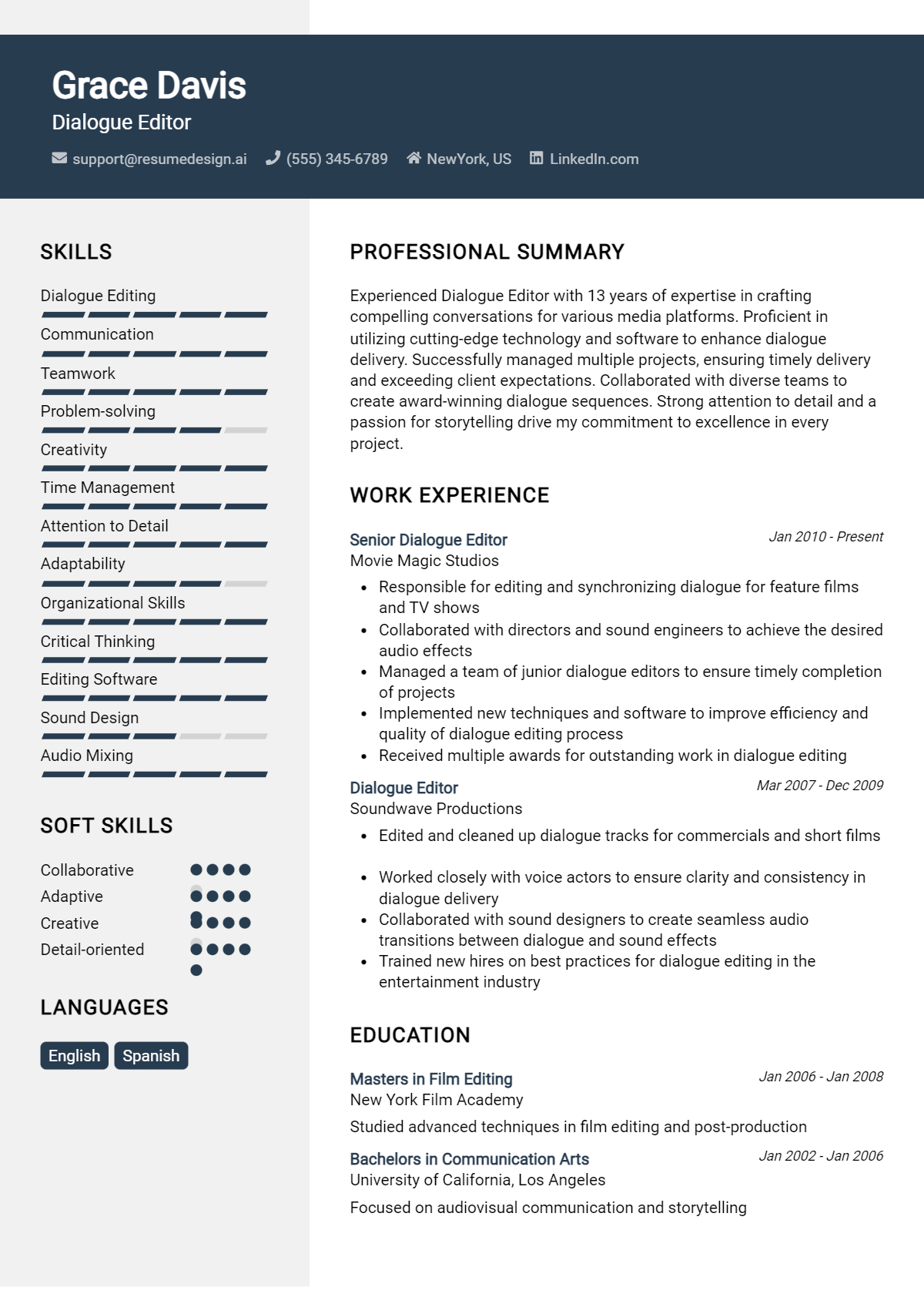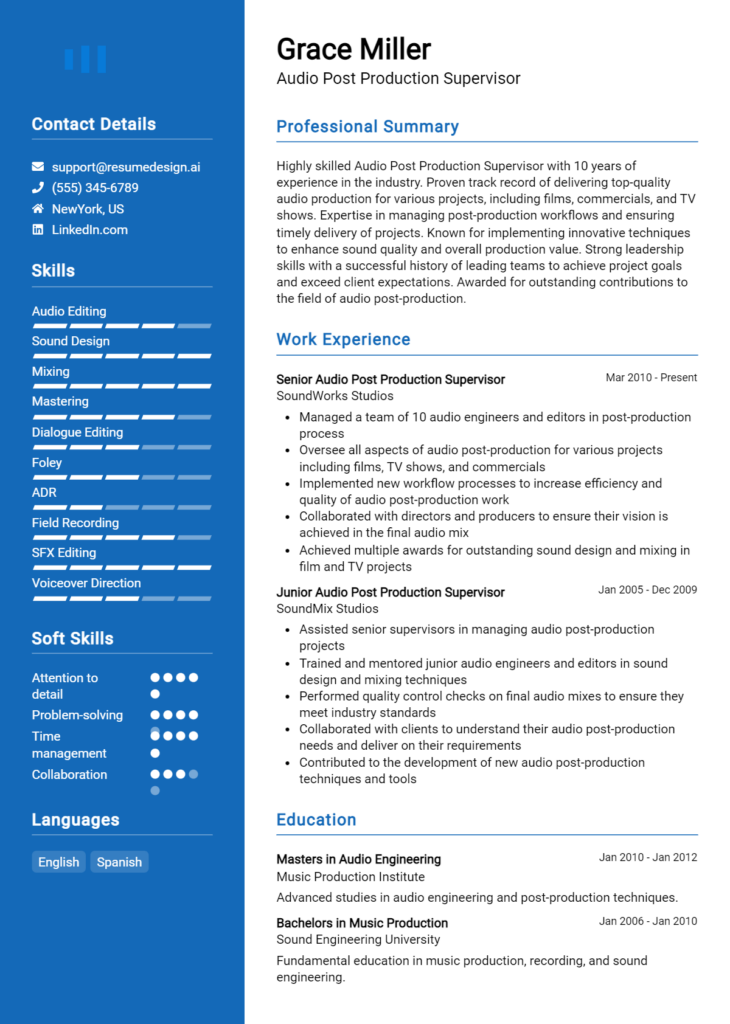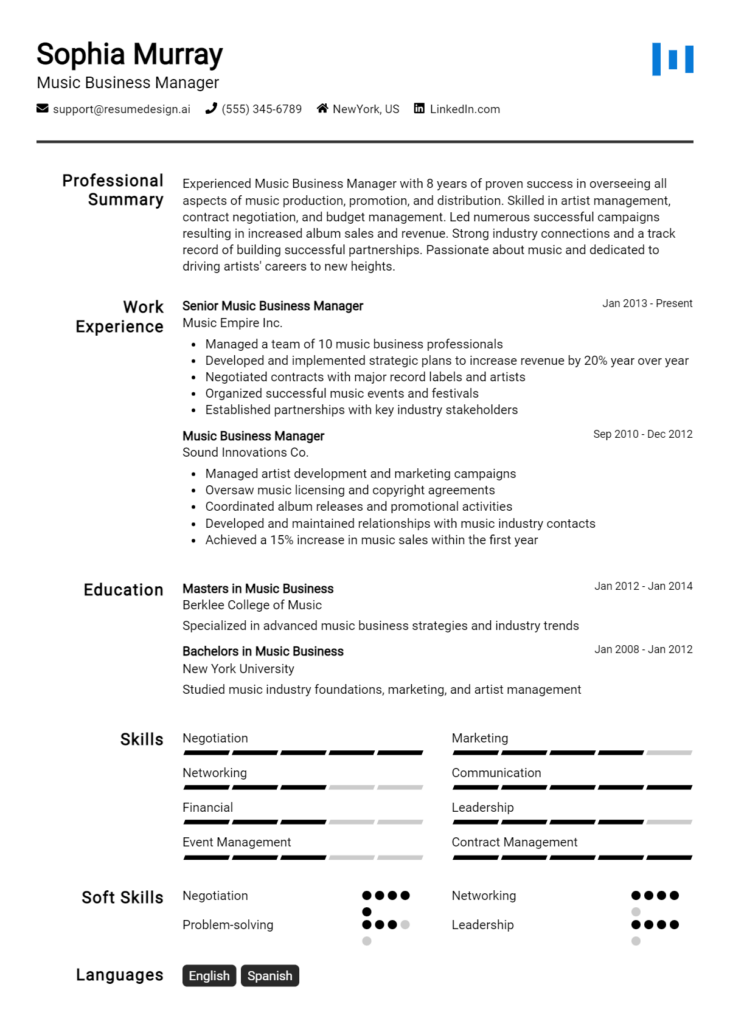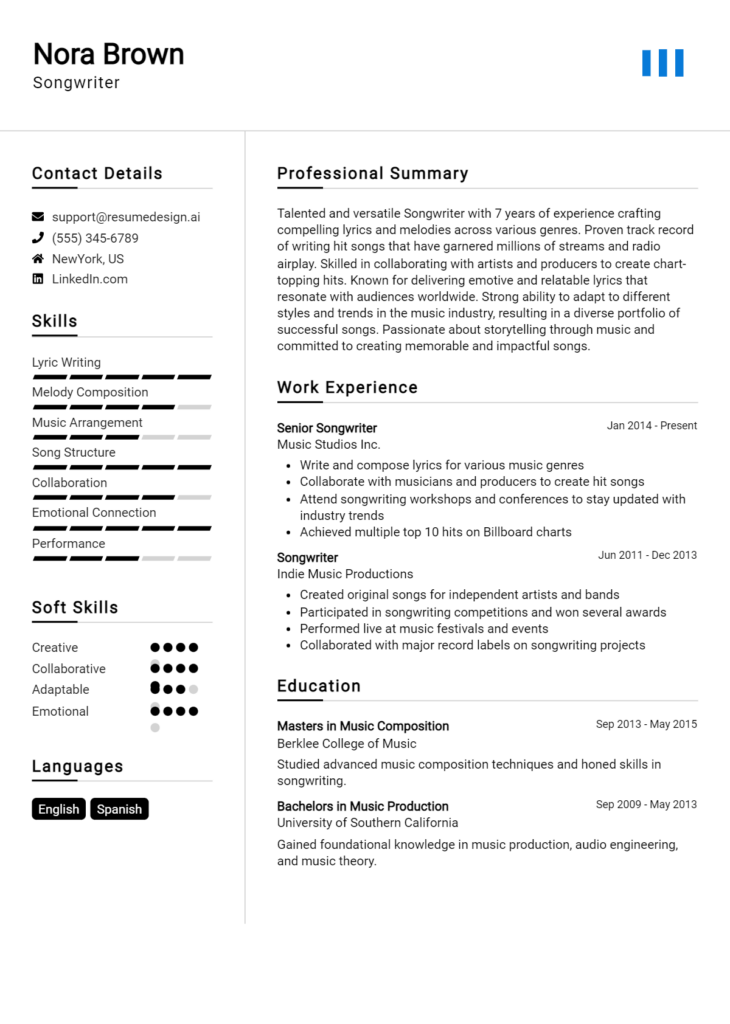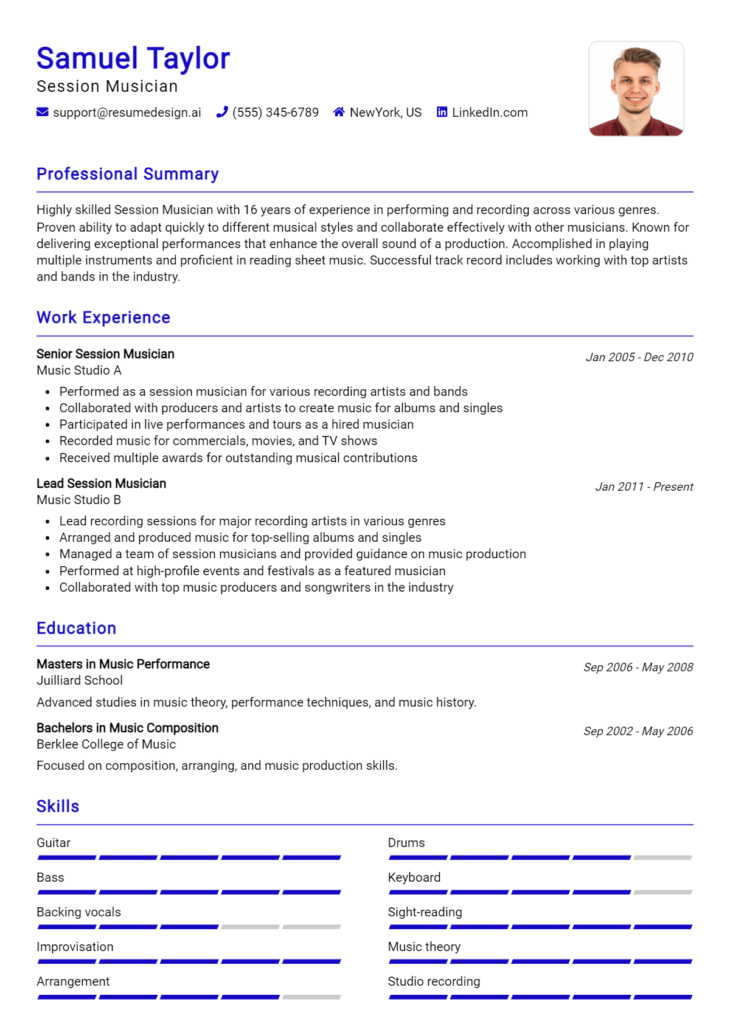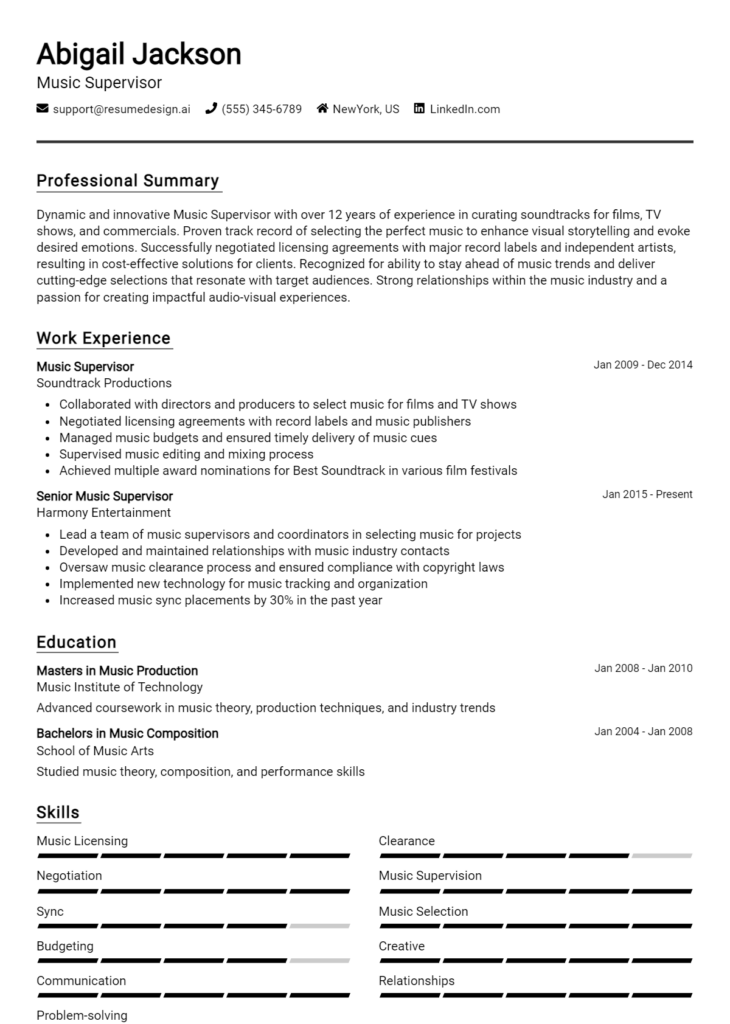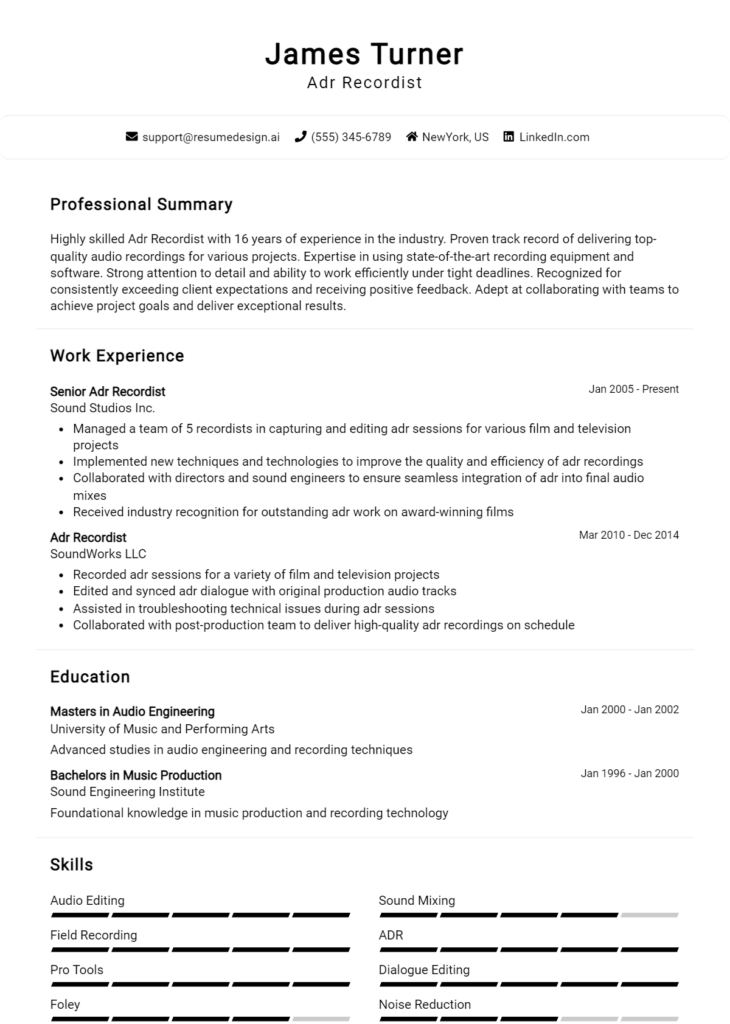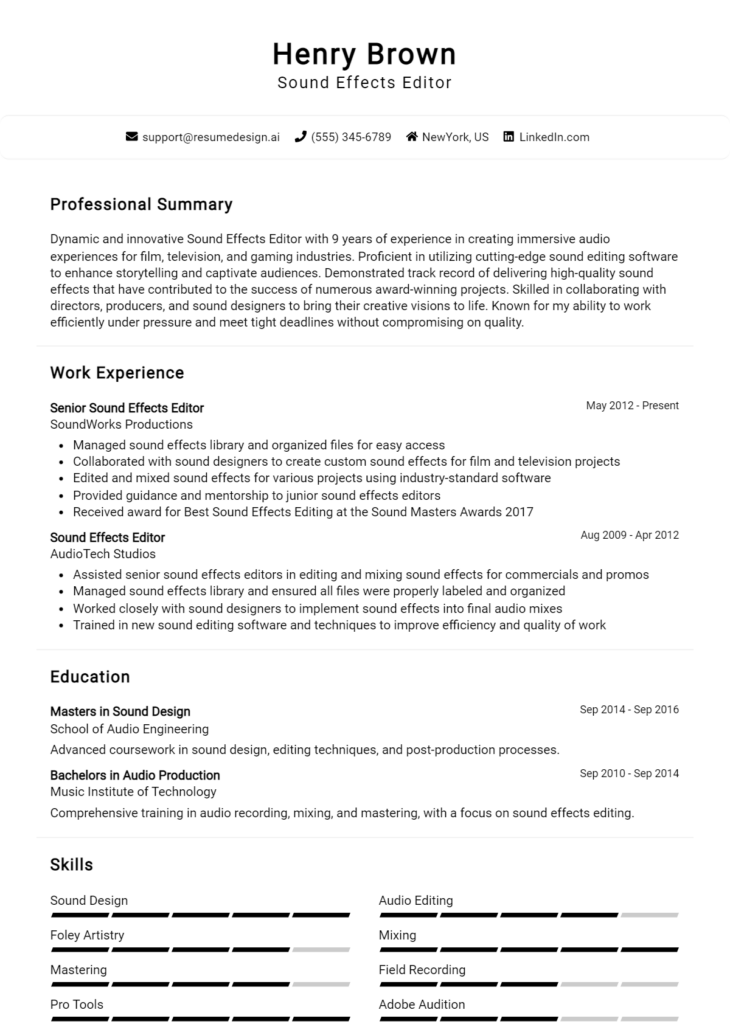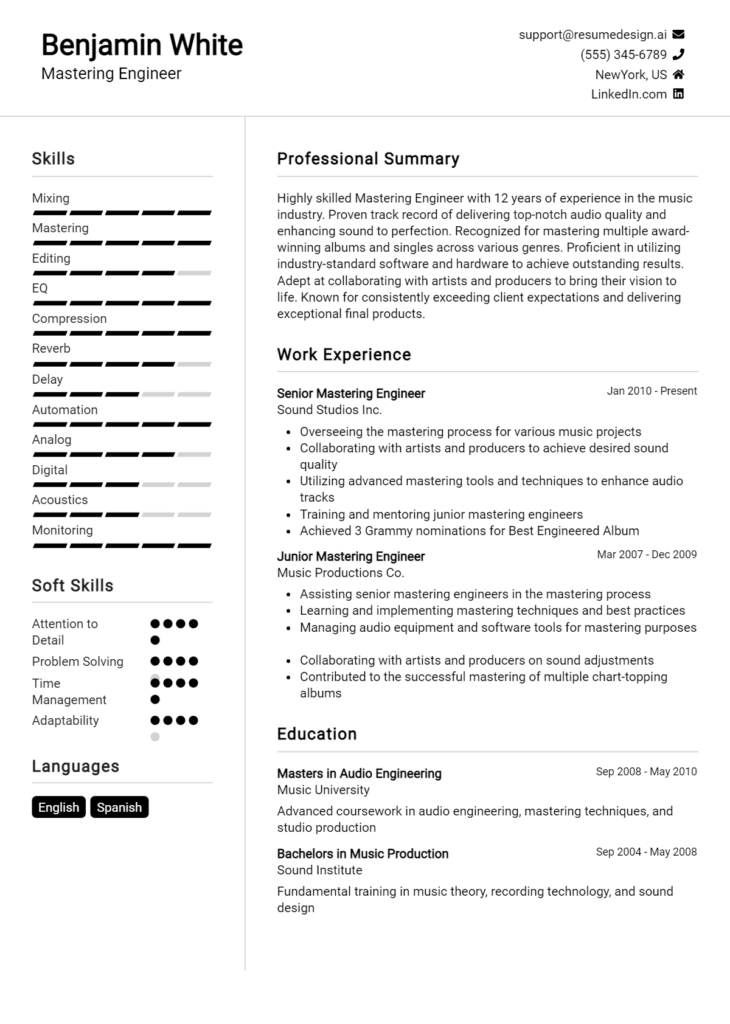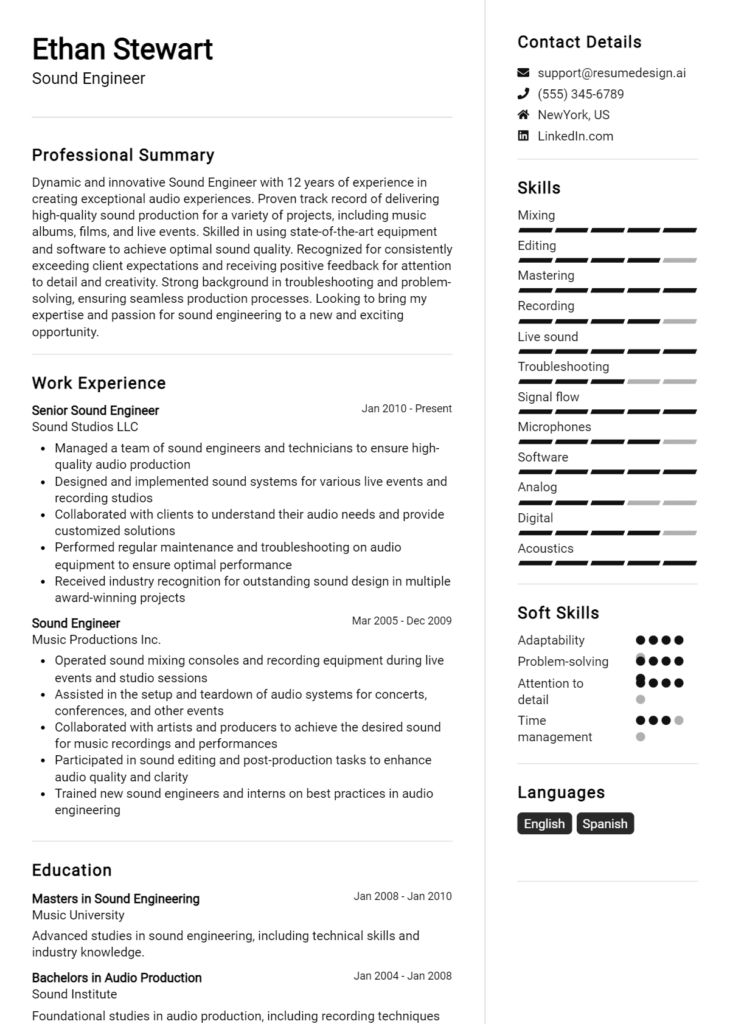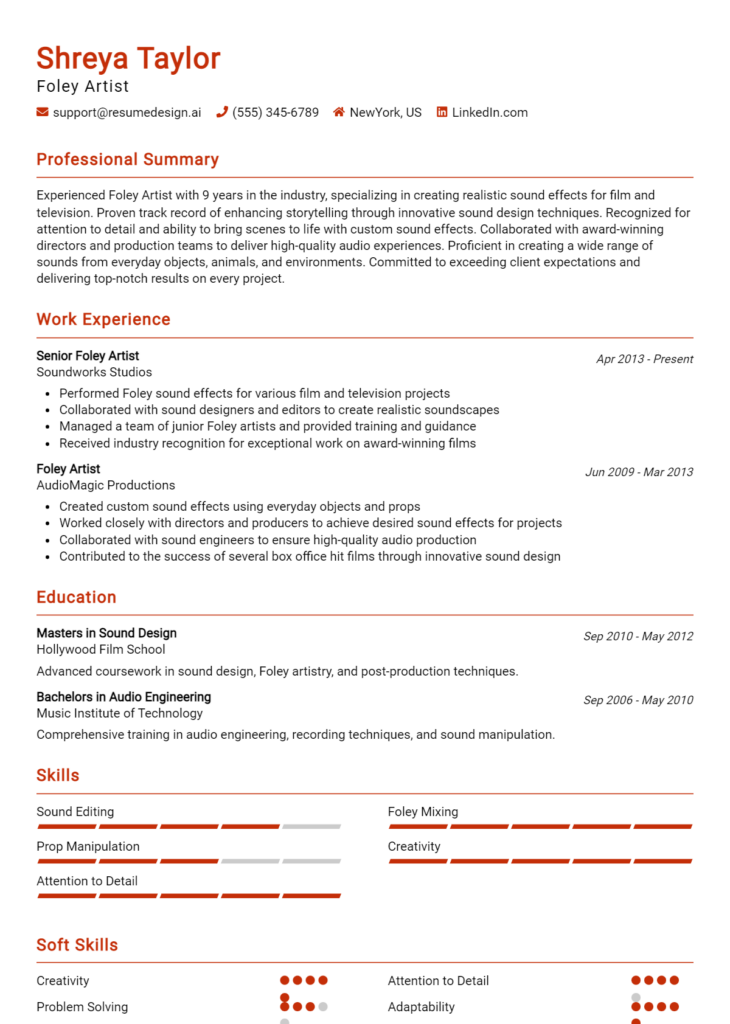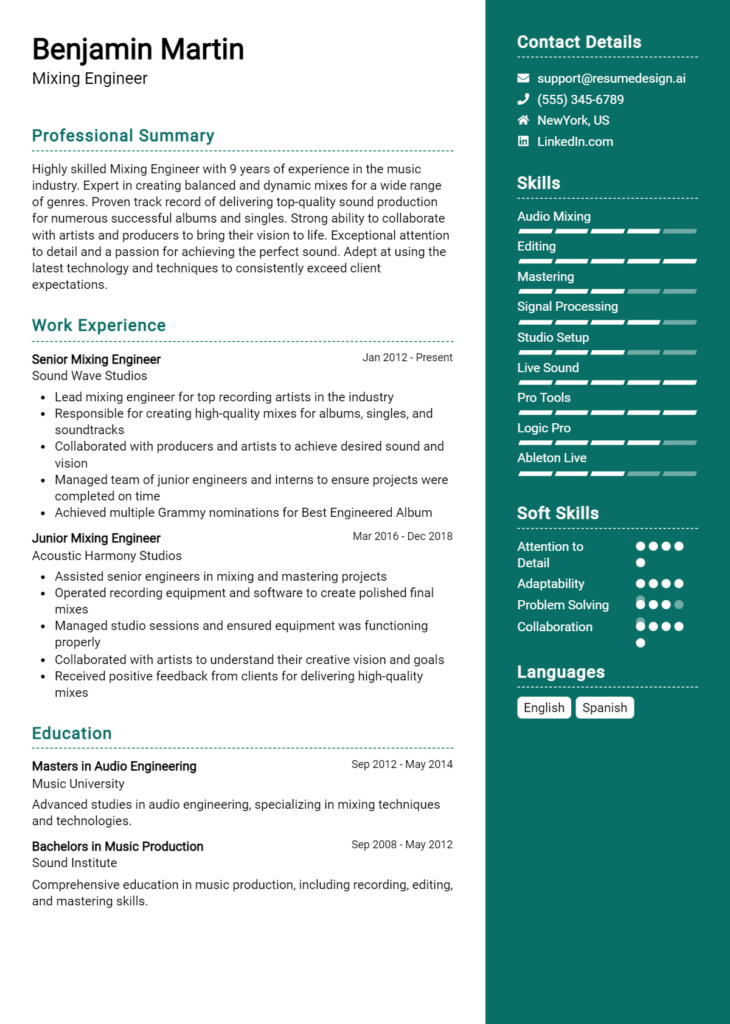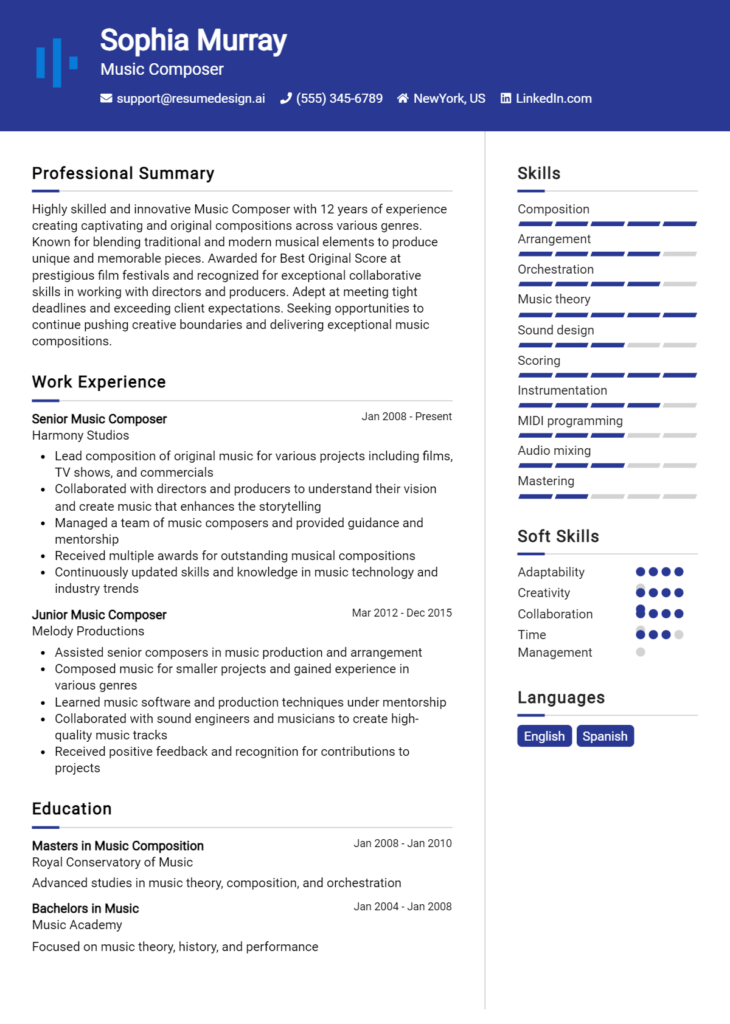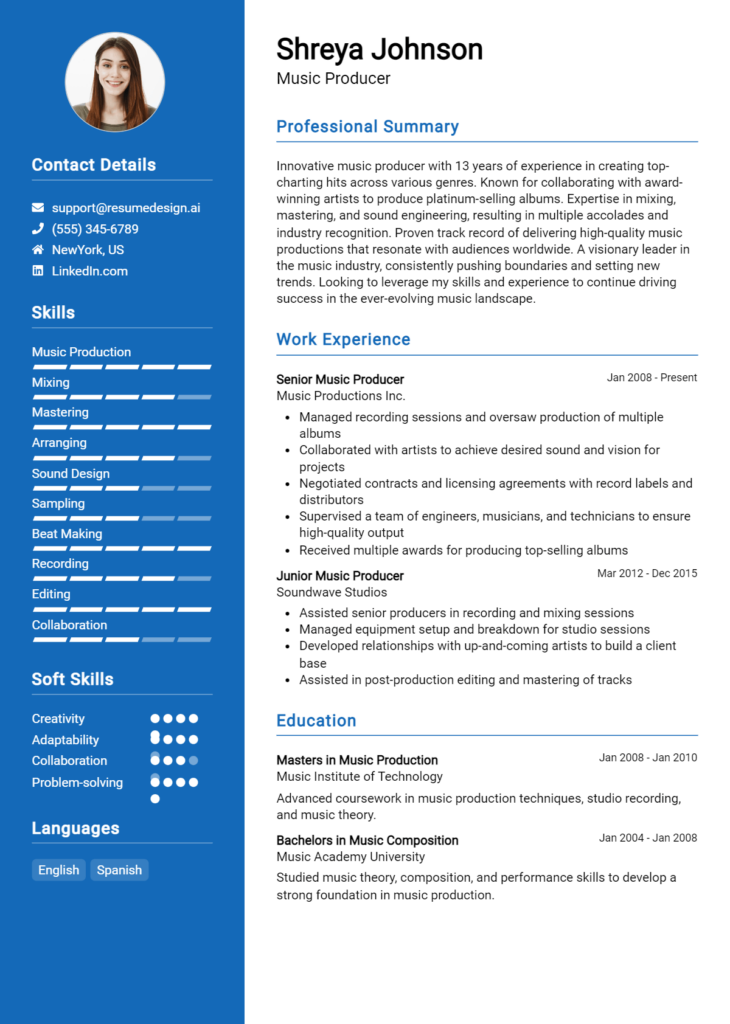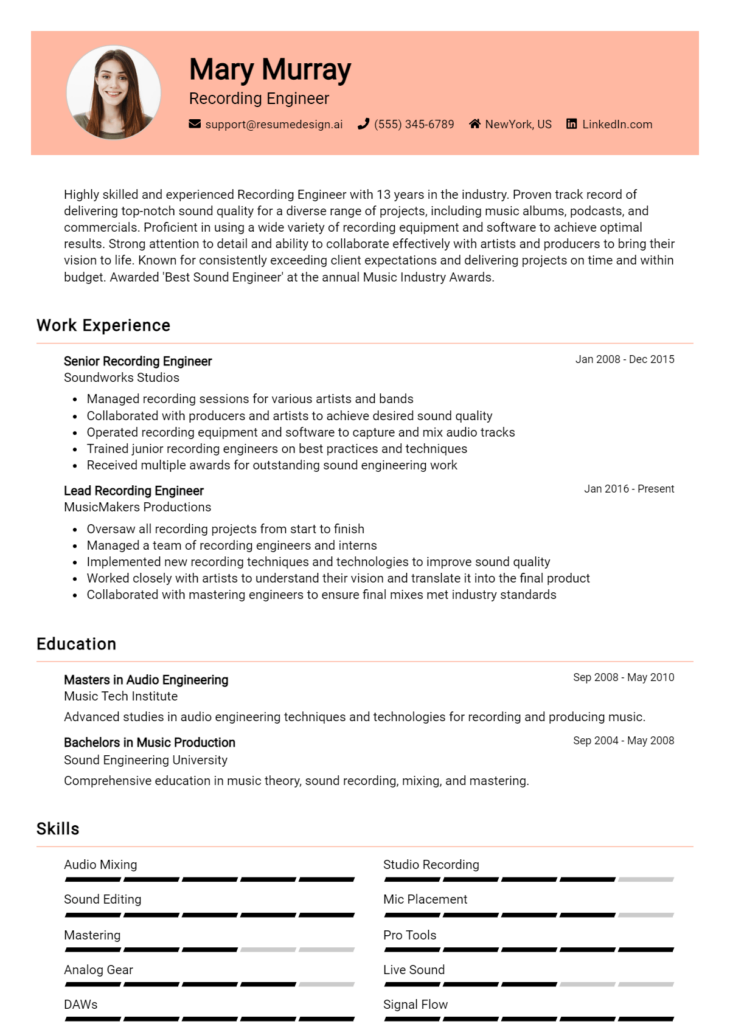Dialogue Editor Core Responsibilities
A Dialogue Editor plays a crucial role in the post-production process, ensuring seamless and high-quality audio for films, television, and video games. This professional collaborates closely with sound designers, directors, and mixers, requiring strong technical skills in audio editing software and an acute ear for dialogue clarity and continuity. Problem-solving abilities are essential for addressing issues such as background noise or misaligned audio. A well-structured resume can effectively showcase these qualifications, illustrating how they contribute to the organization’s overall objectives.
Common Responsibilities Listed on Dialogue Editor Resume
- Editing and cleaning dialogue tracks for clarity and quality.
- Synchronizing dialogue with on-screen action.
- Collaborating with sound designers and mixers to achieve desired audio effects.
- Identifying and resolving audio issues during the editing process.
- Using audio editing software to enhance speech intelligibility.
- Managing multiple audio files and maintaining organized project files.
- Incorporating ADR (Automated Dialogue Replacement) into final mixes.
- Conducting quality control checks on audio deliverables.
- Communicating with directors and producers to align on audio vision.
- Adhering to project deadlines and timelines.
- Maintaining up-to-date knowledge of industry trends and technology.
High-Level Resume Tips for Dialogue Editor Professionals
In the competitive world of audio post-production, a well-crafted resume serves as your first handshake with potential employers. For Dialogue Editor professionals, this document is not just a summary of experiences; it is a strategic tool to showcase your unique skills and achievements in a way that resonates with hiring managers. A strong resume can effectively communicate your technical proficiency in sound editing, your attention to detail, and your ability to bring narratives to life through dialogue. This guide will provide practical and actionable resume tips specifically tailored for Dialogue Editor professionals, ensuring that your first impression is a lasting one.
Top Resume Tips for Dialogue Editor Professionals
- Tailor your resume to the job description by using relevant keywords and phrases that match the specific requirements of the position.
- Highlight your experience with industry-standard software such as Pro Tools, Adobe Audition, or Logic Pro to demonstrate your technical expertise.
- Showcase specific projects you've worked on, including the type of media (film, television, video games) and your role in the dialogue editing process.
- Quantify your achievements by including metrics, such as the number of projects completed, the number of hours saved through your editing, or improvements in audio quality.
- Include any awards or recognitions you’ve received in your field, such as nominations for sound editing at film festivals.
- Emphasize your collaboration skills by mentioning any teamwork experiences with directors, sound designers, or other post-production professionals.
- List any relevant certifications or training courses completed that enhance your qualifications as a Dialogue Editor.
- Keep your resume design clean and professional, ensuring easy readability with clear headings and bullet points.
- Utilize a summary statement at the top of your resume that encapsulates your professional identity and key qualifications in a compelling way.
By implementing these tailored tips, you can significantly increase your chances of landing a job in the Dialogue Editor field. A focused and polished resume that effectively communicates your skills and achievements will not only catch the eye of hiring managers but also set you apart in a competitive job market. Take the time to refine your resume, and watch as new opportunities unfold in your audio editing career.
Why Resume Headlines & Titles are Important for Dialogue Editor
The role of a Dialogue Editor is crucial in the post-production phase of film and television, as they refine and manipulate audio to ensure clarity and coherence in dialogue. An effective resume headline or title is an essential component of a Dialogue Editor's resume, as it serves as the first point of contact with hiring managers. A strong headline not only grabs attention but also succinctly summarizes the candidate's key qualifications in a single impactful phrase. This allows hiring managers to quickly assess the relevance of the candidate to the job being applied for, making it imperative that the headline is concise, relevant, and directly related to the role.
Best Practices for Crafting Resume Headlines for Dialogue Editor
- Keep it concise: Aim for one impactful phrase that summarizes your main qualifications.
- Be role-specific: Tailor the headline to reflect skills and experiences relevant to dialogue editing.
- Highlight key achievements: Incorporate any notable accomplishments that set you apart.
- Use industry-specific terminology: Familiar language can resonate better with hiring managers in the field.
- Avoid jargon: While industry terms are important, steer clear of overly complex language.
- Make it compelling: Create a sense of urgency or importance to draw attention.
- Focus on your unique value proposition: What makes you different from other candidates?
- Consider including years of experience: This can add credibility and context to your qualifications.
Example Resume Headlines for Dialogue Editor
Strong Resume Headlines
Award-Winning Dialogue Editor with 10+ Years of Experience in Film and TV
Skilled Dialogue Editor Specializing in Post-Production Sound Design
Creative Dialogue Editor with Proven Track Record in Enhancing Narrative Impact
Detail-Oriented Dialogue Editor with Expertise in ADR and Foley Techniques
Weak Resume Headlines
Looking for a Job in Audio Editing
Experienced Editor
Dialogue Editor Seeking Opportunities
The strong headlines presented are effective because they not only highlight relevant skills and years of experience but also convey a sense of achievement and specialization that resonates with hiring managers. In contrast, the weak headlines fail to impress due to their vagueness and lack of specificity; they do not communicate any unique qualifications or compelling reasons for a hiring manager to consider the candidate further. By being clear and impactful, strong headlines create a positive first impression and set the stage for a successful resume.
Writing an Exceptional Dialogue Editor Resume Summary
A well-crafted resume summary is crucial for a Dialogue Editor as it serves as the first impression for hiring managers. This brief yet powerful section captures the essence of a candidate's expertise, showcasing key skills, relevant experience, and notable accomplishments in the field of dialogue editing. A strong summary not only grabs attention but also sets the tone for the rest of the resume, making it essential to ensure it is concise, impactful, and tailored to the specific job being applied for.
Best Practices for Writing a Dialogue Editor Resume Summary
- Quantify Achievements: Whenever possible, include numbers to illustrate your contributions, such as the number of projects completed or awards received.
- Focus on Skills: Highlight skills that are directly relevant to dialogue editing, such as proficiency in editing software, sound design, and attention to detail.
- Tailor the Summary: Customize your summary for each job application by incorporating keywords and phrases from the job description.
- Showcase Relevant Experience: Mention specific projects or collaborations that demonstrate your expertise and familiarity with various genres or formats.
- Keep It Concise: Aim for 3-5 sentences that get to the point, ensuring clarity and focus.
- Use Action Words: Start sentences with dynamic verbs that convey your contributions and achievements effectively.
- Highlight Industry Knowledge: Reference any relevant industry trends or tools that showcase your adaptability and ongoing learning.
- Proofread: Ensure the summary is free of grammatical errors and typos, as attention to detail is critical in dialogue editing.
Example Dialogue Editor Resume Summaries
Strong Resume Summaries
Results-driven Dialogue Editor with over 8 years of experience in post-production audio, successfully editing dialogue for award-winning films and television series. Enhanced audio quality for projects leading to a 30% increase in viewer retention rates.
Creative Dialogue Editor skilled in Pro Tools and Adobe Audition, with a proven track record of improving sound clarity and enhancing narrative impact across 50+ projects, including major feature films and documentaries.
Detail-oriented Dialogue Editor with expertise in syncing audio to picture, having contributed to projects that garnered 5 Emmy nominations. Known for exceptional collaboration with directors and sound designers to craft compelling audio narratives.
Weak Resume Summaries
Experienced in audio editing and related tasks, looking for a position in dialogue editing.
A Dialogue Editor with some skills in editing software and a few projects under my belt.
The examples of strong resume summaries are considered effective because they provide specific achievements, quantify results, and highlight relevant skills that align with the role of a Dialogue Editor. In contrast, the weak summaries lack detail, fail to demonstrate quantifiable outcomes, and come off as generic, which does not help to capture the attention of hiring managers.
Work Experience Section for Dialogue Editor Resume
The work experience section of a Dialogue Editor resume is crucial as it demonstrates the candidate's technical skills, ability to manage teams, and commitment to delivering high-quality audio products. This section not only showcases the candidate's proficiency in dialogue editing software and sound design techniques but also highlights their collaborative efforts in team settings. By quantifying achievements and aligning experiences with industry standards, candidates can illustrate their impact and effectiveness in previous roles, making them more attractive to potential employers.
Best Practices for Dialogue Editor Work Experience
- Highlight technical skills related to industry-standard software such as Pro Tools, Adobe Audition, or Avid Media Composer.
- Quantify achievements, such as the number of projects completed on time or the percentage of audio quality improvement.
- Showcase collaboration by mentioning team sizes, cross-departmental projects, or partnerships with directors and sound designers.
- Detail specific responsibilities that demonstrate leadership, such as training junior editors or managing project timelines.
- Use action verbs to make statements more impactful and engaging.
- Align experiences with the job description and industry standards to highlight relevant expertise.
- Include any awards or recognitions received for projects to emphasize excellence in work.
- Be concise and focused, ensuring each bullet point adds value to the overall narrative of your experience.
Example Work Experiences for Dialogue Editor
Strong Experiences
- Led a team of 5 dialogue editors on a major film project, resulting in a 30% reduction in post-production time and receiving a nomination for Best Sound Editing at the XYZ Film Festival.
- Implemented a new sound editing workflow that improved audio quality by 25%, contributing to a 15% increase in audience satisfaction scores based on feedback surveys.
- Collaborated with directors and sound designers on over 20 feature films, ensuring seamless integration of dialogue and sound effects, which enhanced overall cinematic experience and storytelling.
- Trained and mentored 3 junior editors, resulting in their successful promotion to independent project leads within one year.
Weak Experiences
- Worked on various audio projects, focusing on sound editing.
- Assisted in audio post-production for multiple films.
- Participated in team meetings to discuss project progress.
- Responsible for editing audio tracks when needed.
The examples listed are considered strong because they provide specific, quantifiable results and demonstrate technical leadership and collaboration in significant projects. In contrast, the weak experiences are vague and lack measurable outcomes, failing to convey the candidate's impact or technical expertise effectively. Strong experiences clearly illustrate the candidate’s contributions and successes, making them more compelling to potential employers.
Education and Certifications Section for Dialogue Editor Resume
The education and certifications section of a Dialogue Editor resume plays a crucial role in showcasing a candidate's academic qualifications and commitment to the field. This section not only highlights the foundational knowledge acquired through formal education but also emphasizes industry-relevant certifications and specialized training that demonstrate a dedication to continuous learning. By including relevant coursework and recognized credentials, candidates can significantly enhance their credibility and show alignment with the specific requirements of the Dialogue Editor position, making them more appealing to potential employers.
Best Practices for Dialogue Editor Education and Certifications
- Prioritize relevant degrees, such as a Bachelor's in Audio Engineering or Film Production.
- Include industry-recognized certifications, like Avid Pro Tools certification or similar.
- Detail specific coursework related to sound design, editing, or post-production.
- Highlight any specialized training or workshops attended in dialogue editing or audio post-production.
- Maintain a clear structure and chronological order for educational achievements.
- Showcase continuous learning efforts, such as online courses or industry seminars.
- Tailor the education section to reflect the skills and knowledge relevant to the job description.
- Avoid listing outdated or irrelevant degrees and certifications that do not contribute to the role.
Example Education and Certifications for Dialogue Editor
Strong Examples
- Bachelor of Arts in Film Production, University of Southern California, 2020
- Avid Certified Pro Tools User, 2021
- Completion of Advanced Sound Editing Workshop, Sound Design Academy, 2022
- Certificate in Audio Post-Production, Berklee College of Music, 2019
Weak Examples
- Associate Degree in General Studies, Community College, 2015
- Certification in Microsoft Office Applications, 2018
- High School Diploma, 2010
- Online Course in Basic Photography, 2020
The examples provided illustrate the distinction between strong and weak qualifications for a Dialogue Editor role. Strong examples showcase relevant degrees and certifications that directly align with the skills required in dialogue editing, emphasizing specialized training and recent achievements. In contrast, weak examples highlight qualifications that are outdated or irrelevant to the field, such as general studies or unrelated certifications, which do not contribute to the candidate's suitability for the position.
Top Skills & Keywords for Dialogue Editor Resume
As a Dialogue Editor, showcasing relevant skills on your resume is essential, as these abilities not only underline your expertise in audio editing but also reflect your capacity to contribute meaningfully to a production. Employers in the film and television industry seek professionals who can ensure seamless dialogue delivery, enhance the auditory experience, and convey the emotional undertones of a scene. By highlighting your skills effectively, you demonstrate both your technical capabilities and your collaborative spirit, which are crucial for working alongside sound designers, directors, and producers. A well-crafted skills section can make a significant difference in capturing the attention of hiring managers and securing your desired role.
Top Hard & Soft Skills for Dialogue Editor
Soft Skills
- Attention to Detail
- Communication Skills
- Problem-Solving
- Time Management
- Team Collaboration
- Adaptability
- Creative Thinking
- Critical Listening
- Patience
- Organizational Skills
- Emotional Intelligence
- Flexibility
Hard Skills
- Proficiency in Audio Editing Software (e.g., Pro Tools, Adobe Audition)
- Sound Design Knowledge
- Noise Reduction Techniques
- ADR (Automated Dialogue Replacement) Editing
- Foley Sound Integration
- Mixing and Mastering
- Audio Restoration
- Script Analysis
- Understanding of Surround Sound Formats
- Familiarity with Industry Standards and Practices
- Knowledge of Sound Effects Libraries
- Technical Troubleshooting
- Project Management Software Skills
For a deeper understanding of how to effectively present your skills and work experience in your resume, consider exploring additional resources that can help you stand out in your application.
Stand Out with a Winning Dialogue Editor Cover Letter
Dear [Hiring Manager's Name],
I am excited to apply for the Dialogue Editor position at [Company Name] as advertised on [Job Posting Source]. With a strong background in sound design and a passion for storytelling, I am eager to bring my skills in dialogue editing to your dynamic team. Having collaborated on various projects, from independent films to commercial advertisements, I possess a keen ear for capturing the nuances of human speech, ensuring that every conversation resonates with authenticity and clarity.
Throughout my career, I have honed my expertise in industry-standard software, including Avid Pro Tools and Adobe Audition. My meticulous attention to detail allows me to seamlessly edit and enhance dialogue tracks, maintaining the natural flow of conversations while removing unwanted noise or distractions. I take pride in my ability to collaborate closely with directors and sound designers, understanding their vision and translating it into compelling audio experiences. My previous work on [specific project or film name] exemplifies my commitment to high-quality audio production, resulting in an immersive viewing experience that captivated audiences.
Moreover, I thrive in fast-paced environments and am adept at managing multiple projects simultaneously without compromising quality. My strong organizational skills and ability to work under tight deadlines have consistently allowed me to deliver exceptional results. I am particularly drawn to [Company Name] because of your commitment to innovative storytelling and the high standards you uphold in your productions. I am eager to contribute my skills and passion for dialogue editing to help elevate the audio quality of your projects.
Thank you for considering my application. I look forward to the opportunity to discuss how my background and skills align with the needs of your team. I am excited about the possibility of contributing to [Company Name] and am ready to bring my dedication and creativity to your next project.
Sincerely,
[Your Name]
[Your Contact Information]
Common Mistakes to Avoid in a Dialogue Editor Resume
When crafting a resume for a Dialogue Editor position, it's essential to avoid common pitfalls that can undermine your chances of landing an interview. A well-structured resume not only showcases your skills and experiences but also reflects your attention to detail—an essential trait for a Dialogue Editor. Below are some common mistakes to steer clear of while preparing your resume:
Ignoring Industry Terminology: Failing to use industry-specific language can make your resume sound generic. Use terms like "ADR," "Foley," and "syncing" to demonstrate familiarity with the field.
Overloading with Technical Jargon: While it's important to include relevant terminology, overloading your resume with technical jargon can confuse hiring managers. Strike a balance that showcases your expertise without alienating non-technical readers.
Lack of Specific Achievements: Simply listing responsibilities without quantifiable achievements can weaken your resume. Use metrics to highlight your contributions, such as "Improved audio clarity by 30% through meticulous editing."
Vague Job Descriptions: Being too vague in your job descriptions can leave hiring managers guessing about your actual experience. Provide clear, concise examples of your work that demonstrate your skills and accomplishments.
Not Tailoring the Resume: Sending out a generic resume for every job application can hinder your chances. Tailor your resume to match the specific requirements and preferences listed in the job description.
Neglecting to Highlight Collaboration Skills: Dialogue Editors often work closely with sound designers, directors, and other team members. Failing to mention your collaboration and communication skills can overlook a critical aspect of the role.
Poor Formatting: A cluttered or unprofessional format can distract from your qualifications. Use clear headings, bullet points, and consistent font styles to enhance readability while maintaining a polished appearance.
Spelling and Grammar Errors: Typos and grammatical mistakes can signal a lack of attention to detail. Proofread your resume multiple times to ensure it's free of errors, as this reflects your commitment to quality in your work.
Conclusion
As a Dialogue Editor, your role is crucial in shaping the auditory experience of any film, television show, or multimedia project. You are responsible for ensuring that dialogue is clear, engaging, and seamlessly integrated with the overall sound design. Key skills required for this position include an ear for detail, proficiency with editing software, an understanding of sound mixing, and the ability to collaborate closely with directors and sound designers.
Moreover, the importance of creativity cannot be overstated, as you often need to make nuanced decisions about how dialogue interacts with other audio elements to enhance storytelling. A strong understanding of pacing and rhythm in dialogue can also elevate the final product.
In conclusion, if you’re looking to advance your career as a Dialogue Editor, it’s essential to have a standout resume that reflects your skills and experiences. We encourage you to review your Dialogue Editor resume and consider utilizing resources that can enhance your job application. Tools such as resume templates, resume builder, resume examples, and cover letter templates are readily available to help you create a professional and compelling presentation of your qualifications. Take action today and set yourself up for success in your next job application!

